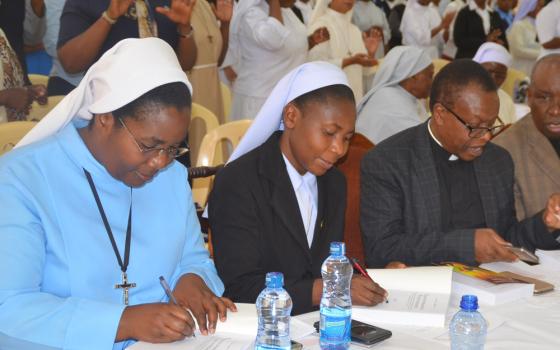Gathered for their annual meeting in Nairobi, alumnae of programs of the African Sisters Education Collaborative, or ASEC, also had a chance Feb. 2 to celebrate the launch of a book that chronicles the work of women religious involved in improving the lives of others and creating positive change in African nations.
Four sisters who were contributor-authors of the book Transformative Partnerships: The Role of Agencies, Church and Religious Institutes in Promoting Strategic, Social and Sustainable Change in Africa spoke during the meeting of about 150 of alumnae of African Sisters Education Collaborative's Sisters Leadership Development Initiative and Higher Education for Sisters in Africa programs. The sisters met starting the evening of Jan. 31 and ending Feb. 3 to take refresher courses, network and share experiences.
This year, the highlight of the alumnae meeting was the book launch. In addition to the sister-authors who spoke, Sr. Jane Wakahiu, of the Little Sisters of St. Francis and editor of the book, addressed the group via Skype. Wakahiu, who serves as the director of the Catholic Sisters Initiative at the Conrad Hilton Foundation, said the book resulted from observing women religious who, grounded in spiritual witness and living the Gospel values, tirelessly provide essential services in remote regions of Africa. (The Hilton Foundation also funds Global Sisters Report.)
Wakahiu said transformative partnerships provide the sisters with an opportunity to share various stories on religious life as lived in Africa. "It is important for us to tell our own stories and experiences as a way to share our own narrative," she said. "We have often allowed western world writers to tell stories of our lived experiences in religious life; it is important we tell these stories ourselves on the perceptions and experiences as we live the life." She told the sisters gathered that "our narrative must be heard — we have chosen to live this life — how do we perceive and live it? Religious life as understood and lived by women in Africa!"
She added that "to help amplify and foster visibility of women religious and to understand the journeys, collaborations and how women religious are impacting communities in Africa, research and publications are important facets to disseminate the stories and impact of the work of sisters. In addition, research articles provide documentation to learn what works in sisters' ministries and partnerships necessary to create social change in Africa."
In her introductory message to the book, Wakahiu wrote: "In today's rapidly changing world, partnership and collaborations that transcend geographic borders, culture and creeds can enhance and hasten solutions to the most unnerving challenges in ineffaceable ways."
Wakahiu's motivation to write the book came from seeing how women religious were solving difficult systemic issues with meager resources. It struck her that there is need for sisters to collaborate, since no single organization could accomplish their mission alone.
She envisioned the book as a tool "to learn the strategies and approaches utilized by women religious to engage and collaborate with local communities in creating projects that address socioeconomic, health and education issues," she said in her address.
By engaging in systems thinking and operations, partners can gain mutual benefits and projects that will not only result in collective efforts, but can also create momentum to bring about desired changes in communities, she said.
She also congratulated chapter authors for their resilience, commitment and hard work. While 46 individuals submitted chapters, only 26 completed the work for the chapters included in the published book.
Some of the authors are religious sisters who have recorded their congregational or collaborative experiences in various fields, while others are academics who have focused their quantitative and qualitative research on the impact of the lives and ministries of the sisters in different contexts.
Sharing her experience, Wakahiu said women religious work diligently and silently, mentioning that as leaders they exhibit images of culture, spirit and hope, and as mentors they are sources of support for the vulnerable and disadvantaged.
"I have worked in the trenches to find ways to break the walls that separate women and girls from educational opportunities. I have seen the prophetic witness of the women religious as they lead by example, striving to root out poverty, illiteracy, ill health and early death, and rescuing young women from cultural practices. Regardless of the challenges faced by women religious, they keep working to find solutions to end poverty and displaced people, and give dignity to differently abled individuals," she said.
Sr. Mary Germina Keneema, a member of the Missionary Sisters of Mary Mother of the Church and director of ASEC Uganda, researched women religious' contributions to health communities in Uganda. Kneema said she was keen to find out what makes hospitals run by sisters succeed in delivering good health services as compared to government hospitals.
"The research was very exciting, I got cooperation from the sisters and this made it successful. I encourage alumni to get involved in research to keep the ASEC research project ongoing," she said in her speech.
Sr. Deusdita Lutego, a member of the congregation of the Missionary Sisters of St. Therese of the Child Jesus, in the Diocese of Iringa in Tanzania, based her research on assessment upon her own congregation's mission expansion strategies. Lutego said the congregation was started in 1935 as a diocesan congregation but now it is in the process of becoming a pontifical congregation, after it expanded its mission to other dioceses in the country, and to Liberia, Italy and Haiti.
She wanted to find out challenges the congregation faced and give recommendations to strengthen sisters in areas of education so as to serve better as they expand throughout the world. She also encouraged other sisters to contribute for the next publication.
Sr. Helen Kasaka of the Family of the Little Servants of Mary in Zambia contributed to a chapter about Zambia. She said it was motivating and interesting to talk with people and see the challenges they face. "Some of it involved sisters going in bars to help prostitutes," she said, encouraging people to read the book for more insight.
Sr. Teresa Mulenga, a member of congregation of Sisters of St. Teresa of the Child Jesus in Malawi examined the role of the superiors of women's congregations in empowering religious sisters in Malawi, and how they select sisters to take specific courses. She said she found out that they follow policies and procedures to reduce speculations of people thinking that the selections are biased.
While congratulating ASEC's Sisters Leadership Development Initiative and Higher Education for Sisters in Africa alumnae gathered for the annual meeting, Wakahiu encouraged the sisters to continue looking forward to make a difference in the lives of the people they serve. "We can reveal Christ through our work and presence with the marginalized and disadvantaged people," she said.
She said the Hilton Foundation hopes to support the creation of data platforms through the partnership with the Association of Sisterhoods of Kenya, the Catholic University of Eastern Africa (or CUEA) and Tangaza University College, adding that data gathered will articulate the trends and impacts of sisters and their ministries but also inform in creation of meaningful programmatic interventions that address critical needs facing sisters and their ministries.
Speaking as he launched the book, the Rev. Stephen Mbugua, CUEA vice chancellor, thanked the Hilton Foundation for the support of the publication of the book, and Wakahiu for her work at the foundation, and for editing the book. "On behalf of the Catholic institutions of higher learning in the region, I wish to extend our gratitude to the Conrad Hilton Foundation and its local representatives for choosing us to partner with you on the issues of education, research and other strategic partnerships we hold," he said.
"We also look to operationalize the data center at the Catholic University of Eastern Africa that will strengthen our linkages in research and repository of data for the religious," he said.
Wakahiu told the sisters that as religious, their call is of prophetic witness in the communities they serve. "Our presence in the ministries speaks of who we are, and attract more women to join us to serve God," she said. "Research will help to disseminate research not only on work but also the journeys that have led us to where we are. Thank you to all contributors, for each chapter provides a unique story of congregations, collaboration with dioceses or opportunities available to make a difference in the communities we serve."
[Rose Achiego is a freelance writer and radio program producer based in Nairobi, Kenya.]

